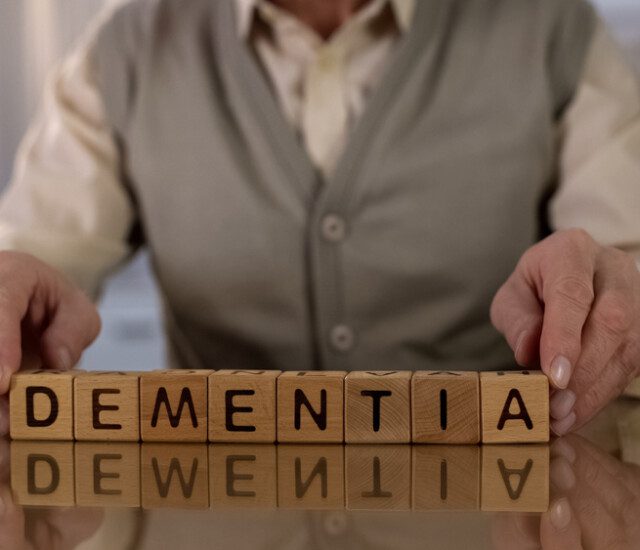While some minor cognitive decline can be a normal part of aging, that doesn’t make it any less scary or frustrating — whether you experience it yourself or witness it in a loved one. At The Stayton, we offer regular brain-stimulating programming to help challenge our residents and serve healthy and delicious meals in our restaurants to support both brain health and physical health. And while a healthy brain is important, it’s also important to understand the progression of memory loss and what options are available — whether you’re looking for a loved one currently struggling with memory loss or you’re simply considering what long-term care is available down the road.
Signs of Alzheimer’s
Just as your skin doesn’t act the same as it did in your 20s, neither does your brain. Memory blips or occasional forgetfulness, like forgetting to pay a bill on time but remembering again later, can be a normal part of aging. What is not normal is if those issues persist without later remembering. To help determine whether or not a memory lapse is a normal part of aging, The Alzheimer’s Association outlines 10 early signs and symptoms of dementia. If you notice changes in a loved one, consult with their doctor.
Alzheimer’s progresses in three stages: mild, moderate and severe. Many people with the disease continue to live successfully on their own during the early stage. Making simple adjustments, taking safety precautions and having the support of others can make things easier.
If memory issues become more severe and start to interfere with everyday functioning or make someone a risk to themselves, it might be time to consider memory care options.
Understanding Memory Care Options
When it comes to living with Alzheimer’s and other dementias, there are a variety of options available to help support you and your loved one, including adult day centers, in-home care, respite care and residential care.
Adult Day Center
If your loved one continues to live at home, adult day centers help provide much needed relief to caregivers as well as opportunities for structure and socialization for your loved one. It’s important to note that the hours of operation, daily or monthly fees and type of services offered can vary greatly from one day center to another, but the Community Resource Finder from the Alzheimer’s Association and the AARP can help you find options around Fort Worth.
In-home Care
In-home care provides additional caregiver support for those whose loved ones remain at home. This type of hired care can include companionship, help with housekeeping, assistance with personal care or skilled medical care. The cost of in-home care will depend upon the type of hired care and the number of hours of care provided.
Respite Care
As the name implies, respite care provides some respite for caregivers with loved ones living at home. Adult day centers and in-home care can both provide respite care. Some senior living communities also offer respite care, including overnight services. This type of residential respite care might be offered for a few days to a few weeks and is not typically covered by insurance or Medicare.
If your loved one requires more hands-on care than you can provide at home, residential care is an excellent option. Residential care options offer varying levels of care to older adults. Some residential care communities might be specifically for those requiring memory care, while others, like continuing care retirement communities (CCRCs), offer a full continuum of care. The cost of residential care can vary greatly depending on the level of care provided as well as additional services and amenities offered.
Prepare for a Care-Needs Discussion
It’s important to make the care choice that is best for both you and your loved one. This is a decision that will likely require multiple conversations and check-ins throughout the decision-making process, many of which can be difficult, frustrating or emotional. Our best advice? Take some time to do your research. That includes looking into all the care options available to you and talking to someone who has experienced caring for someone with dementia firsthand. Whether that person is a family member, neighbor or a peer in a support group, it’s helpful to know that you are not alone.
As you do your research, consider whether or not your loved one needs more care than they are currently receiving or more advanced care than you are able to provide.
The Stayton is a CCRC in Fort Worth, Texas, offering independent living, assisted living, skilled nursing and memory care services to residents. This means that additional care and support from trained professionals is readily available on-site should your loved one require it as the disease progresses. We are proud to be a Medicare-rated five-star healthcare center offering physical, intellectual, sensory, social and spiritual opportunities daily for residents living with varying stages of Alzheimer’s.
Our team of directors meets weekly to ensure the needs of our residents are being met. If we or a loved one has concerns about the memory of a resident, we work together to form a plan. Some families opt to hire a 24-hour caregiver to come to their loved one’s residence, while others prefer the security of our dedicated memory care wing. No matter where your loved one receives the support they need, it is our top priority to treat our residents with the dignity and respect they deserve.
If you’d like to learn more about the memory care services we offer at The Stayton, please fill out the form below or give us a call at 817-349-7140.


